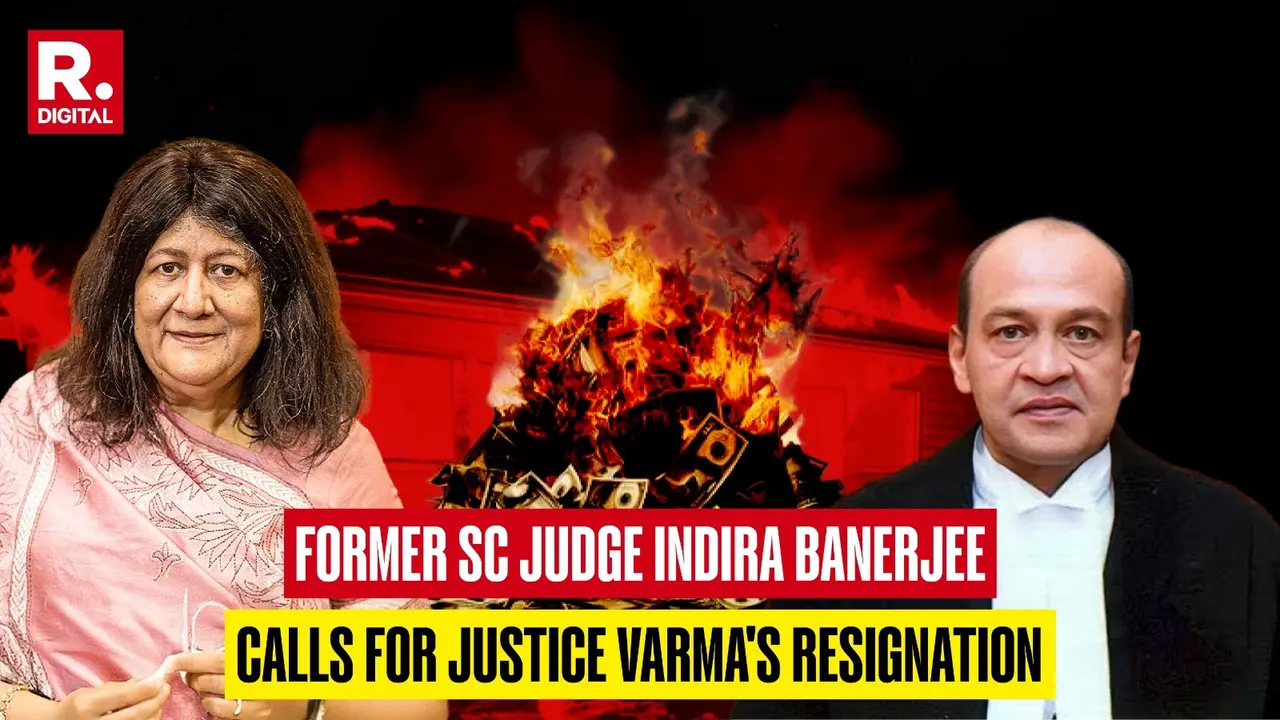Updated 23 March 2025 at 06:09 IST
Justice Yashwant Varma Should Resign: Former SC Judge Indira Banerjee Weighs In on Delhi Judge Cash Scandal
Former SC judge Indira Banerjee explains how a High Court judge can be removed in an exclusive conversation with Republic Media Network.
- India News
- 4 min read

New Delhi: Former Supreme Court Judge Indira Banerjee, in an exclusive conversation with Republic Media Network, stated that Justice Yashwant Varma, who is under scrutiny after a huge pile of unaccounted cash was discovered at his residence, should resign if the allegations are proven true, as this is a very serious matter.
When asked what actions the Delhi High Court Justice and Supreme Court Collegium could take, former SC judge Indira Banerjee explained that a High Court judge can only be removed following the provisions laid out in the Constitution.
According to Article 217, a High Court judge can be removed from office by the President in the manner specified in Article 124 for the removal of a Supreme Court judge. Clause 4 of Article 124 stipulates that a Supreme Court judge can only be removed through an order by the President, following an address in each House of Parliament, supported by the majority of the total membership of the House and by not less than two-thirds of the members present during voting. Once the motion is passed, it must be presented to the President in the same session, on the grounds of proven misbehaviour or incapacity.
In such circumstances, depending on the report from the Chief Justice of the High Court—if it is adverse to the judge concerned—the Chief Justice of India (CJI) may institute an internal inquiry. This inquiry is typically held as per a resolution adopted by the Supreme Court in the 1990s. During the internal inquiry, the concerned judge must be given an opportunity to present their case. The inquiry committee, comprising two Chief Justices and one High Court judge (other than from the concerned judge's High Court), may recommend the judge's resignation, Ex-SC Judge Indira Banerjee said.
Advertisement
If the offense is serious—as it appears in this case, given the reports of a large cash discovery—the committee could recommend impeachment and submit a report to the CJI. The CJI, in turn, may advise the judge to resign. Should the judge refuse, the CJI may submit a report to the appropriate government to initiate impeachment proceedings.
Regarding Justice Yashwant Varma's transfer and the Allahabad High Court's assertion that it is "not a trash bin," former SC judge Indira Banerjee said that the Chief Justice of the concerned High Court may have already taken away his judicial responsibilities since he was sent back to his parent High Court. However, she suggested that a transfer alone may not suffice in a serious case like this.
Advertisement
When asked about the appropriate course of action in Justice Yashwant Varma's case, Indira Banerjee stated that his judicial duties should have been withdrawn immediately if that had not already been done. It has been reported that the Chief Justice has advised him to resign and that an internal inquiry is being contemplated, she said.
However, Indira Banerjee noted that the CJI and the Collegium are constrained by constitutional provisions, as a High Court judge can only be removed through resignation or as mentioned under Article 124, Clause 4 of the Constitution. This clause specifically requires that the removal of a Supreme Court judge be ordered by the President after an address in each House of Parliament, supported by a majority of the total membership and not less than two-thirds of the members present during voting, with the motion presented to the President in the same session on grounds of proven misbehaviour or incapacity. This is the prescribed process for removal.
Thus, the CJI can, at best, institute an inquiry based on the Supreme Court's full court resolution adopted in the 1990s to address allegations against the judge in question.
Get Current Updates on India News, Entertainment News, Cricket News along with Latest News and Web Stories from India and around the world.
Published By : Shashwat Bhandari
Published On: 22 March 2025 at 17:06 IST
